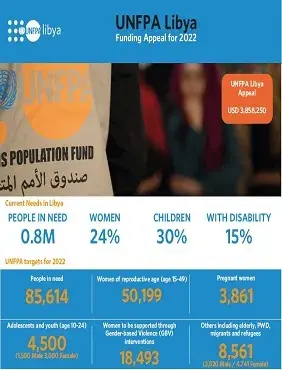Violence and turmoil continue to adversely affect the population and hinder social, economic and political development in Libya.
Libya is ranked very low at Human Development Index 2020 - 105 out of 189 countries. According to Humanitarian Needs
Overview 2022 (HNO 2022), Libya continues to struggle to cope with the effects of ongoing conflict and insecurity, an economic
and governance crisis and the impacts of COVID-19.
According to the Humanitarian Needs Overview (HNO) 2022 - KEY FINDINGS, it is estimated that 804K people are identified
to be in need of humanitarian assistance including migrants (28,8%), IDPs (16,4%) and returnees (14,3%).
Libya’s health system, close to collapse prior to the onset of the COVID-19 pandemic, has been further weakened by the
exponential spreading of the virus. Challenges in accessing health services are higher in the southern region, compared to other
parts of the country, and among migrants and refugees more than Libyan population groups. Women and girls are more likely to
face challenges in accessing health services due to the lack of documentation required by many public health facilities.
The ongoing armed conflict, protracted instability, and COVID-19 pandemic have disproportionately impacted the lives of
women and girls in Libya, resulting in increased cases of domestic violence and other forms of gender-based violence. The lack
of specialized services for GBV survivors, and the lack of trust in existing health services further aggravates the situation
According to the protection cluster response plan for 2018, 307,000 women of reproductive age are in need of protection,
including internally displaced persons, returnees and host communities.
Young people in Libya make up a quarter of the population. In a youth survey of 2016, young Libyans described safety and
security as the main challenges they face, followed by lack of employment opportunities, life skills and education. Despite the
proliferation of armed groups and youth enrolment in them, the majority of Libyan youth are ready and willing to participate in
social development, economic productivity and peacebuilding initiatives.
What we do
Funding Appeal 2022

Publisher
Number of pages
2
Author
UNFPA Libya
Publication
Funding Appeal 2022
Publication date
03 February 2022

